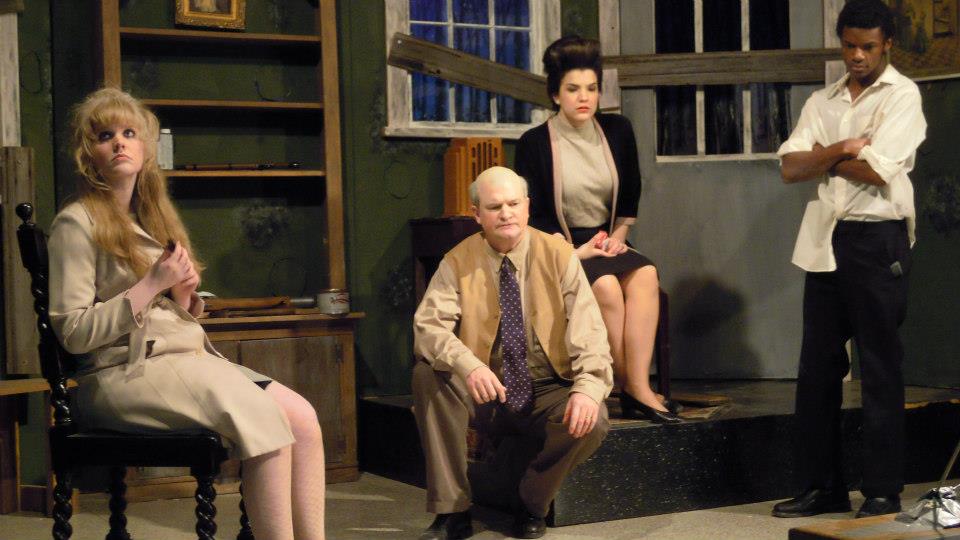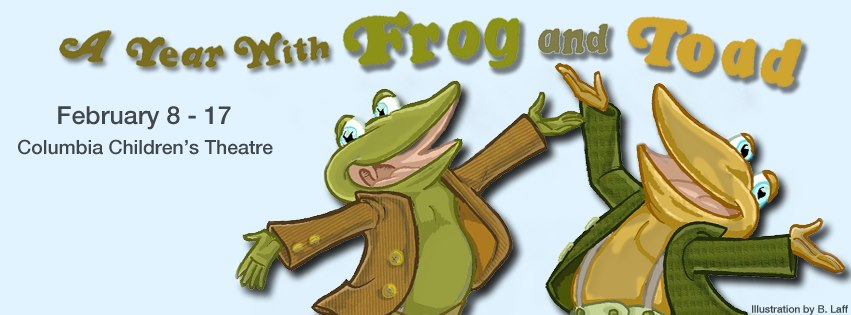The Velvet Weapon, by Deborah Brevoort, is the winner of the 2013 Trustus Playwrights' Festival, and will receive a full production in the summer of 2014, preceded by a staged reading this coming Saturday, August 10th, at 2 PM on the Thigpen Main Stage at 520 Lady Street in the Vista. As sponsor of one of the nation's longest-running play festivals, Trustus has nurtured and fostered the growth of new playwrights such as David Lindsay-Abaire, who later went on to win the Pulitzer Prize.
Over the following year, each winning playwright has the chance to develop the script for production, with the opportunity for input from and consultation with members of the Trustus staff and company, based on feedback at the initial staged reading. This year's reading will be directed by Chad Henderson, chosen by Jasper readers as the 2012 Theatre Artist of the Year. Included in the cast are Paul Kaufmann (Next to Normal and I Am My Own Wife at Trustus) Raia Jane Hirsch (The Motherf*@%er With the Hat at Trustus, Pride and Prejudice with SC Shakespeare Co.) Kayla Cayhill (The Shape of Things at Workshop) Trustus Managing Director Larry Hembree, Eric Bultman, and Chelsea Crook.
The reading is free and open to the public, but seating is limited; the bar will be open, with liquid refreshments for sale.
Deborah Brevoort holds an MFA in Playwriting from Brown University and an MFA in Musical Theatre writing from NYU’s Tisch School of the Arts, where she currently teaches. She also teaches in the MFA playwriting programs at Columbia University and Goddard College. Her web site is www.DeborahBrevoort.com. She is perhaps best known for her work The Women of Lockerbie, which won the Kennedy Center’s Fund for New American Plays Award, and the silver medal in the Onassis International Playwriting Competition. It has been produced across the U.S., as well as in Scotland, Japan, Greece, Spain, Belarus, Poland, Australia and England, and has been translated into seven languages.
The Velvet Weapon was inspired by the Velvet Revolution in the former Czechoslovakia, and is described as "a hilariously smart backstage farce that will leave you laughing while also engaging you long after you've left the theatre," and "a humorous exploration of populist democracy told through a battle between high-brow and low-brow art. At the National Theatre of an unnamed country, a matinee audience rises up in protest over what is being performed on stage, and demands something new. They begin a performance of their own of The Velvet Weapon, a play by an unproduced playwright of questionable talent."
The author kindly agreed to share some thoughts with Jasper via e-mail in this exclusive interview!

Jasper: You have written drama, comedy, and the books for musicals. Is The Velvet Weapon your first venture into farce?
Brevoort: Velvet Weapon is my first farce, although one of my previous plays, The Poetry of Pizza, an Arab/American comedy about love, used elements of farce here and there. Albert Bermel, who wrote the definitive critical study on farce, said that it was “an older dramatist’s medium, because the techniques involved are so formidable.” That surprised me; farces tend to feel so slight. They are like meringues that melt the minute they hit your mouth. So, I wanted to try my hand at the form to see what was so difficult. I was greatly humbled by it, I have to say. These “slight” little plays are built like Swiss watches!
Jasper: Do you find it challenging or difficult to move from one form to another, or does that give you a sort of freedom, to work in whatever form suits the material?
Brevoort: I love writing in multiple forms. I always find it difficult to move back and forth between them, but that is also the pleasure of it. As a writer, I have a couple of rules for myself. One is that I don’t ever repeat myself. Another is that in every project I do, there must be something that I don’t know how to do. These rules help to ensure that I am always stretching myself as an artist, and that I don’t stagnate, or get too comfy.
Jasper: Your theatrical career began at Alaska's Perseverance Theatre, and from there you moved into writing - how did that transition take place?
Brevoort: I was the Producing Director of Perseverance Theatre, which means I was the person who raised all the money, and was the public administrative face of the theatre. But Perseverance was an unusual company, because we were basically a group of artists who administered ourselves and the company. I started out as an actor, and worked in the acting company for the better part of 13 years. I had always wanted to be a writer, so when we started offering playwriting classes at the theatre, led by Paula Vogel and Darrah Cloud, I took them. Paula snatched me out of the class, told me I was writer, and gave me a fellowship to come to Brown University to make the switch from theatre producing and acting to writing. I accepted the fellowship, and moved to NYC, where I’ve been ever since, working as a playwright, lyricist and librettist.
Jasper: I gather that contemporary themes, especially relating to political and social topics, recur in your work, although perhaps sometimes not overtly. Do you have a particular goal in your work?
Brevoort: I am not aware that I have a political agenda or even that I have political themes - I just write what interests me. And I am committed to writing each project truthfully, whatever that may entail.
Jasper: How easy or difficult is it to make the audience think while still entertaining them?
Brevoort: There are plenty of techniques you can use as a playwright to make an audience think or feel. To me it’s simply a matter of craft. It’s no harder to make an audience think than feel—it just requires different tools. I do have to say, however, that the hardest thing to do is to make an audience laugh. That is 100 times harder than to make them cry.
Jasper: Why did the "velvet revolution" in Czechoslovakia appeal to you as source material?
Brevoort: I was very good friends with Pavel Dobrusky, a Czech scenographer who defected from the former Czechoslovakia and came to work with us at Perseverance Theatre in the mid-1980’s. When the Velvet Revolution happened in 1989, Pavel worked with us on production called Wonderland, a sort of Alice-in-Wonderland take on the events taking place in Eastern Europe. It was one of my favorite productions at Perseverance Theatre.
Fast forward 15 years: Pavel and I both now live in NYC and got to talking one night about The Velvet Revolution and how we’d love to make a theatre piece about it. Pavel knew all the theatre artists who had been involved—they were his old friends. We put together a grant request to CEC Arts Link, which gave money to theatre artists to do projects in Eastern Europe. We got the grant, which enabled the two of us to go to both the Czech and Slovak Republics and to interview all the artists who collaborated with Vaclav Havel to bring down the Soviet regime. We spent about a month conducting intense, in-depth interviews with 43 of the ringleaders.
After the interviews, I remarked to Pavel that the Velvet Revolution was like one, great big back stage farce. Literally. So, I wrote the play as a farce.
The goal was for Pavel to eventually direct the play. But unfortunately, Pavel passed away.
Jasper: Once you finished the play, you had readings at La Mama and the NJ Playwright’s Theatre? How did that process work?
Brevoort: In addition to getting a CEC Arts Link grant to do the interviews, I got a playwriting fellowship from the NJ Council on the Arts, to write the play. The reading at the NJ Playwright’s Theatre was part of that fellowship. Pavel directed the reading, which was done for about 30 NJ senior citizens, all of whom thought I was writing a satire about Obama.
The La Mama reading was part of the New York Public Library for the Performing Arts “Performing Revolution in Central and Eastern Europe” festival, a citywide, 5-month event to commemorate the 20th anniversary of the Velvet Revolution. Pavel was no longer in NYC at that point, so he didn’t direct the reading. Many audience members at the reading were from Eastern Europe, so they got all the references in the play and recognized it as the story about Vaclav Havel. The other half knew nothing about the Velvet Revolution and thought I was parodying populist democratic movements taking place around the world.
In February of this year I had a reading of the play at William Patterson University in NJ, and this time the audience thought I was writing about Occupy Wall Street.
This of course tickles me to no end; it was my goal that this play be about populist democracy not about the Velvet Revolution—and it appears to be working on that level because people are seeing references to American politics or world politics in it. But I have also loaded the play with lots of inside jokes and references that only Eastern Europeans would “get”—and they seem to be “getting” them.
Each reading helped me to CUT the script. Speed of delivery is necessary for farce. If you have one syllable too many in a line, you won’t get a laugh. So these readings have helped me to pare each line down so they work like darts.
Jasper: How did you discover Trustus and the Playwrights' Festival?
Brevoort: I have heard about Trustus for many years, most recently when I was the playwright-in-residence at Center Stage in Greenville, SC. I’m delighted to get a chance to work with them! I’ve never been to Columbia, so I don’t know anything about the community, and am looking forward to coming down and being there next year for rehearsals.
~ August Krickel
 The Richard and Debbie Cohn Trustus Side Door Theatre is about to house a fresh documentary-style theatre piece called You Better Sit Down: Tales from My Parents’ Divorce. This show examines a social phenomenon that affects Americans daily. You Better Sit Down: Tales from My Parents’ Divorce opens in the Trustus Side Door Theatre on Friday February 20th and runs through Saturday, March 7, 2015. Tickets may be purchased at www.trustus.org.
The Richard and Debbie Cohn Trustus Side Door Theatre is about to house a fresh documentary-style theatre piece called You Better Sit Down: Tales from My Parents’ Divorce. This show examines a social phenomenon that affects Americans daily. You Better Sit Down: Tales from My Parents’ Divorce opens in the Trustus Side Door Theatre on Friday February 20th and runs through Saturday, March 7, 2015. Tickets may be purchased at www.trustus.org.







